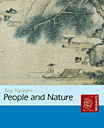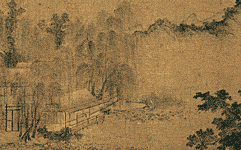|
 Tiny Travelers: Tiny Travelers:
People and Nature
(Chinese philosophical views)
Even though the simple and rustic rural life drastically changed
into complicated urban structure, and even though our pace of life
becomes faster and more diverse, these changes altered little of
the Chinese' respect for nature. The Chinese still maintain a belief
that human life and nature is intimately interrelated.
 Fear
and Respect Fear
and Respect
Hundreds of thousands of years ago, the Chinese learned to use fire
to break away from darkness, to vent off danger in nature, and to
begin a civilization of enlightenment. Later, the Chinese transposed
their fear of the nature into various kinds of burial and worshipping
rituals. For example, when they were frightened by beasts and animals,
they decorated their daily tools with the images of these animals.
By doing so, they hoped to show respect for these fearful natural
objects who had great power, which would in turn protect them.
Contention
Since the legend of Tsang Chieh, the reputed inventor of Chinese
writing, the Chinese forebears were known to record their experiences
in writing and pass on their knowledge and teachings through literary
means. These practices were also believed to prompt the development
of legal systems and rituals which promised to bring stability and
peace to the society. When the Chinese achieved a peaceful and stable
society, they began their desire for immortality. This desire is
reflected by the excessive burial objects that were excavated from
the tombs.
 Incorporation Incorporation
Chinese have changed their perception with respect to nature over
time. They first had fear of nature and thus devised objects to
express their respect for it. Later, when words were invented, the
Chinese developed a will to challenge nature, in particular, the
natural phenomenon of death, and thus conceived contenting burial
objects to express their will. Finally, the Chinese realized that
natural phenomena, such as natural landscapes and seasonal cycles,
are truly immortal phenomena, whereas human life is merely a transient
phenomenon, like the life of a traveler passing through many different
places and scenes throughout his/her life. Because of this realization,
the Chinese expressed their inner appreciation of the natural landscape
by painting them, and hoped that through a meditating experience
with these landscapes, they could find meaning, values, and the
rhythms of life.
Other
Titles
|

 Tiny Travelers:
Tiny Travelers:
 Fear
and Respect
Fear
and Respect  Incorporation
Incorporation